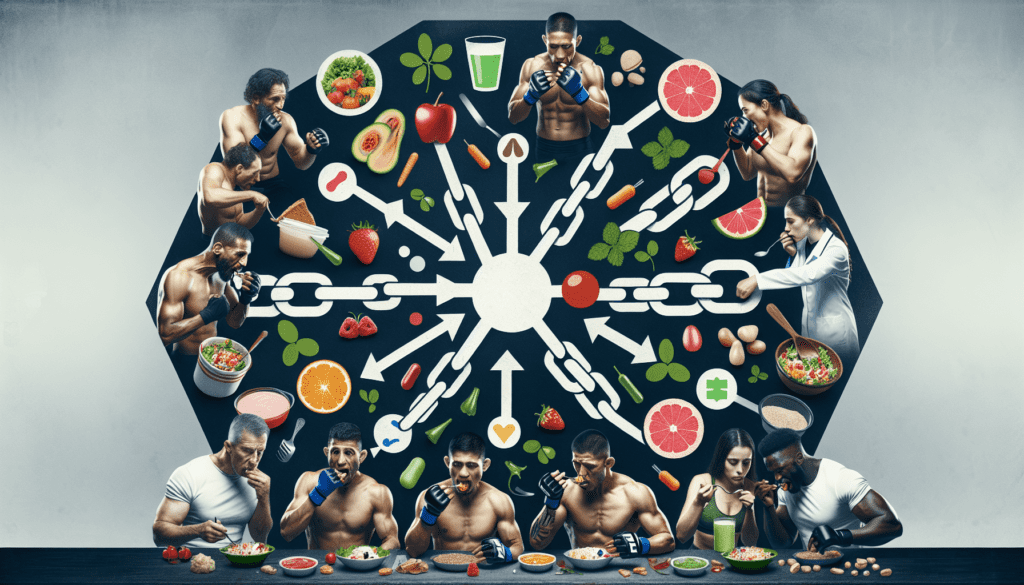Have you ever wondered how professional MMA fighters recover from the intense physical demands of their sport? One crucial aspect that often goes overlooked is the role of proper nutrition in aiding their recovery. In this article, we will explore the importance of nutrition in injury prevention for MMA fighters. By ensuring that their bodies are fueled with the right nutrients, fighters can optimize their recovery time, reduce the risk of injuries, and maintain peak performance levels. Whether you’re a seasoned MMA athlete or just a fan of the sport, understanding the significance of proper nutrition in the recovery process is essential for both longevity and success in the world of mixed martial arts.

Importance of Proper Nutrition for Recovery
When it comes to MMA, proper nutrition plays a critical role in ensuring optimal performance and recovery. The intense physical demands of MMA training and competitions require a well-balanced diet that provides the right nutrients to fuel the body, enhance muscle repair and growth, boost immune function, reduce inflammation, and promote overall health and well-being.
Fueling the Body for Optimal Performance
Carbohydrates are the primary fuel source for the body during intense training sessions or competitions. They are quickly broken down into glucose, which is used by the muscles as energy. Without sufficient carbohydrates in your diet, you may experience fatigue, reduced performance, and poor recovery. It is important to include a variety of carbohydrates in your meals, such as whole grains, fruits, and vegetables, to ensure a steady supply of energy throughout the day.
Enhancing Muscle Repair and Growth
Protein is essential for muscle repair and growth. During intense training, small tears occur in the muscle fibers, and it is through proper nutrition that these tears are repaired, resulting in stronger and more resilient muscles. Including high-quality sources of protein, such as lean meats, fish, eggs, and plant-based options like tofu and legumes, in your meals can help support muscle recovery and growth.
Boosting Immune Function
Intense training can put a strain on your immune system, making you more susceptible to illness. Proper nutrition, particularly the intake of vitamins and minerals, plays a crucial role in boosting immune function. Vitamins A, C, and E, along with zinc and selenium, are known for their immune support properties. Including a variety of fruits, vegetables, whole grains, and lean meats in your diet can help ensure you are getting an adequate amount of these essential nutrients.
Reducing Inflammation
Inflammation is a natural response to exercise and is necessary for muscle repair and recovery. However, chronic inflammation can hinder recovery and increase the risk of injury. Certain foods, such as fatty fish rich in omega-3 fatty acids, can help reduce inflammation in the body. Including foods like salmon, tuna, and walnuts in your diet can provide you with the anti-inflammatory benefits of omega-3 fatty acids.
Promoting Overall Health and Well-being
Proper nutrition not only supports recovery but also promotes overall health and well-being. A well-balanced diet that includes a variety of fruits, vegetables, whole grains, lean proteins, and healthy fats provides your body with the essential nutrients it needs to function optimally. This can improve your energy levels, mood, cognitive function, and overall quality of life, both inside and outside the gym.
Macronutrients for MMA Recovery
Macronutrients, including carbohydrates, protein, and fats, are essential for MMA recovery as they provide the building blocks and energy needed for optimal performance and muscle repair.
Carbohydrates: The Fuel Source
Carbohydrates are the body’s primary source of energy during intense physical activity. They are broken down into glucose, which is used by the muscles for fuel. Including carbohydrates in your meals and snacks before, during, and after training sessions or competitions can help ensure that your energy levels are sustained and that you can perform at your best.
Protein: Building Blocks for Muscle Repair
Protein is crucial for muscle repair and growth. It provides the essential amino acids needed to rebuild damaged muscle fibers and promote recovery. Aim to include a source of protein in every meal and snack, such as lean meats, poultry, fish, eggs, dairy products, or plant-based options like tofu, tempeh, and legumes.
Fats: Essential for Hormone Production
Although often demonized, fats are essential for the production of hormones, including those involved in muscle repair and recovery. Including sources of healthy fats, such as avocados, nuts, seeds, and olive oil, in your diet can help support optimal hormone production and overall recovery.
Micronutrients for MMA Recovery
Micronutrients, including vitamins and minerals, are necessary for various functions in the body, including muscle function and recovery. Ensuring an adequate intake of these essential nutrients is crucial for MMA recovery.
Vitamins: Essential for Energy Production and Recovery
Vitamins play a vital role in energy production and recovery. B vitamins, for example, are involved in the metabolism of carbohydrates, proteins, and fats, converting them into energy. Vitamin C is known for its antioxidant properties, which can help reduce oxidative stress and promote recovery. Including a variety of fruits, vegetables, whole grains, and lean proteins in your diet can help ensure you are getting a sufficient amount of vitamins.
Minerals: Supporting Muscle Function and Recovery
Minerals, such as calcium, magnesium, and potassium, are essential for muscle function and recovery. Calcium is necessary for muscle contractions, while magnesium helps relax muscles and reduces muscle cramps. Potassium plays a vital role in fluid and electrolyte balance. Including foods rich in these minerals, such as dairy products, leafy greens, nuts, seeds, and bananas, can help support optimal muscle function and recovery.

Proper Hydration for MMA Recovery
Proper hydration is crucial for optimal performance and recovery in MMA. Dehydration can lead to fatigue, impaired cognitive function, and decreased muscle function. Ensuring you are adequately hydrated before, during, and after training sessions or competitions is essential for optimal performance and recovery.
Importance of Water in Exercise Performance
Water is the most critical nutrient for the body, and its importance in exercise performance cannot be overstated. It helps regulate body temperature, transports nutrients throughout the body, and aids in the removal of waste products. During intense training, water loss occurs through sweat, and it is important to replenish those losses to avoid dehydration.
Electrolytes: Replenishing Essential Minerals
Electrolytes, including sodium, potassium, chloride, and magnesium, are essential for maintaining fluid balance, nerve function, and muscle contractions. They are lost through sweat during intense training and need to be replenished to maintain optimal function. Including foods and beverages rich in electrolytes, such as sports drinks, coconut water, bananas, and nuts, can help ensure you are adequately replenishing these essential minerals.
Hydration Strategies Before, During, and After Training
To ensure proper hydration, it is important to have a hydration plan before, during, and after training sessions or competitions. Start by hydrating adequately before exercise, aiming to drink about 16-20 ounces of water or a sports drink a few hours before training. During exercise, drink fluids regularly, aiming for about 7-10 ounces every 10-20 minutes. After exercise, replenish fluids by consuming water or a sports drink.
Timing of Nutrition for MMA Recovery
The timing of your nutrition plays a crucial role in MMA recovery. Properly fueling your body before, during, and after training sessions or competitions can enhance performance and promote optimal recovery.
Pre-Workout Nutrition
Pre-workout nutrition is essential to ensure that you have enough energy and nutrients to sustain your training session. Aim to eat a balanced meal or snack containing carbohydrates, protein, and healthy fats about 1-2 hours before training. This will provide your body with the necessary fuel and nutrients to perform at your best.
Intra-Workout Nutrition
During prolonged intense training sessions, it may be necessary to consume carbohydrates and electrolytes to maintain energy levels and prevent dehydration. Sports drinks, energy gels, or easily digestible snacks like bananas or energy bars can be consumed during breaks in training sessions to provide the necessary fuel and hydration.
Post-Workout Nutrition
Post-workout nutrition is crucial for muscle recovery and replenishing energy stores. Aim to consume a meal or snack containing carbohydrates and protein within 30-60 minutes after training to optimize recovery and promote muscle repair.
Bedtime Snack for Recovery
Consuming a snack before bedtime can support overnight recovery and muscle repair. Aim for a snack that contains a combination of carbohydrates and protein, such as Greek yogurt with berries or a small turkey and avocado sandwich. This can help provide your body with the necessary nutrients to repair and rebuild muscles while you sleep.
Supplementation for MMA Recovery
In addition to a well-balanced diet, certain supplements can aid in MMA recovery and enhance performance. It is important to note that supplements should be used in conjunction with a proper diet and under the guidance of a healthcare professional or sports nutritionist.
Protein Shakes and Bars
Protein shakes and bars can be convenient and effective ways to ensure you are meeting your protein needs for optimal recovery. They are convenient options for post-workout nutrition when a whole meal may not be feasible. Look for high-quality protein sources, such as whey or plant-based protein.
Creatine: Improving Muscle Strength and Recovery
Creatine is a naturally occurring compound that helps provide energy to the muscles during high-intensity activities. It has been shown to improve muscle strength, power, and recovery. If considering creatine supplementation, it is important to follow recommended dosages and consult with a healthcare professional.
BCAAs: Preventing Muscle Breakdown
Branched-chain amino acids (BCAAs), including leucine, isoleucine, and valine, are essential amino acids that play a critical role in muscle repair and growth. Taking BCAA supplements before, during, or after training sessions can help prevent muscle breakdown, reduce muscle soreness, and enhance recovery.
Omega-3 Fatty Acids: Reducing Inflammation
Omega-3 fatty acids are known for their anti-inflammatory properties and can help reduce inflammation in the body. Taking omega-3 fatty acid supplements, such as fish oil or algae-based supplements, can support overall recovery and reduce the risk of inflammation-related injuries.
Meal Planning and Preparation
Proper meal planning and preparation can help ensure that you are consistently consuming a well-balanced diet that supports MMA recovery.
Creating Balanced Meals with Proper Macronutrient Ratios
When planning meals, aim to include a balance of carbohydrates, protein, and healthy fats. This will provide your body with the necessary nutrients to perform at its best and support optimal recovery. Experiment with different recipes and meal ideas to ensure variety and enjoyment in your diet.
Meal Timing and Frequency
In addition to the composition of your meals, the timing and frequency of your meals are also important for MMA recovery. Aim to eat every 3-4 hours to ensure a steady supply of energy and nutrients. This will help maintain stable blood sugar levels and prevent energy crashes during training sessions.
Prepping Meals in Advance for Convenience
To make healthy eating more convenient, consider prepping meals in advance. Spend some time on the weekends or during rest days to prepare meals and snacks for the upcoming week. This will help you make healthier choices and avoid relying on processed or unhealthy options when you are busy or tired.
Optimizing Weight Cutting and Rehydration
Weight cutting is a common practice in combat sports, including MMA. However, it is important to approach weight cutting safely and effectively to avoid adverse effects on performance and recovery.
Safe and Effective Methods for Cutting Weight
When it comes to weight cutting, it is essential to prioritize the safety and well-being of the athlete. Extreme and rapid weight loss methods can lead to dehydration, muscle loss, decreased performance, and increased risk of injury. Working with a registered dietitian or sports nutritionist can help ensure that weight cutting is done in a safe and effective manner.
Rehydration Strategies after Weigh-In
After the weigh-in, proper rehydration is crucial to replenish fluid and electrolyte losses and restore optimal performance. Begin by consuming fluids that contain electrolytes to restore the mineral balance in your body. Water, sports drinks, and coconut water can be effective options for rehydration. Also, include foods and snacks that have high water content, such as fruits and vegetables, to support rehydration.
The Role of Rest and Recovery
Rest and recovery are crucial components of MMA training. Without adequate rest and recovery, the body cannot repair and adapt to the demands of training, which can lead to overtraining, increased risk of injury, and decreased performance.
Importance of Adequate Sleep
Getting enough sleep is vital for recovery and optimal performance. During sleep, the body repairs damaged tissues, restores energy levels, and regulates hormone production. Aim for 7-9 hours of quality sleep each night to support optimal recovery and overall health.
Active Recovery Techniques
Active recovery involves engaging in low-intensity activities to promote blood flow and enhance the removal of metabolic waste products from the muscles. Light exercises such as swimming, cycling, or yoga can help reduce muscle soreness, improve flexibility, and enhance recovery.
Incorporating Rest Days into Training Schedule
Rest days are essential for allowing the body to recover and adapt to the physical demands of training. Plan regular rest days into your training schedule to give your body the time it needs to recover and recharge. Use these days to focus on relaxation, stretching, foam rolling, or engaging in other activities you enjoy.
Seeking Professional Guidance
Proper nutrition for MMA recovery can be complex, and seeking guidance from professionals can help ensure you are meeting your individual needs and optimizing your performance.
Consulting with a Sports Nutritionist
A sports nutritionist or registered dietitian with expertise in combat sports can provide tailored advice and guidance to optimize your nutrition for MMA recovery. They can help determine your individual macronutrient and micronutrient needs, develop personalized meal plans, and address any specific concerns or goals you may have.
Working with a Strength and Conditioning Coach
In addition to nutrition, working with a strength and conditioning coach can help optimize your performance and recovery in MMA. They can design individualized training programs, monitor your progress, and provide guidance on proper form, technique, and rest and recovery strategies.
By prioritizing proper nutrition for recovery in your MMA training, you can enhance performance, reduce the risk of injury, and optimize your overall health and well-being. Remember to fuel your body with the right macronutrients, include essential vitamins and minerals, stay properly hydrated, and prioritize rest and recovery. With the right approach, you can reach your full potential in MMA and stay at the top of your game.

